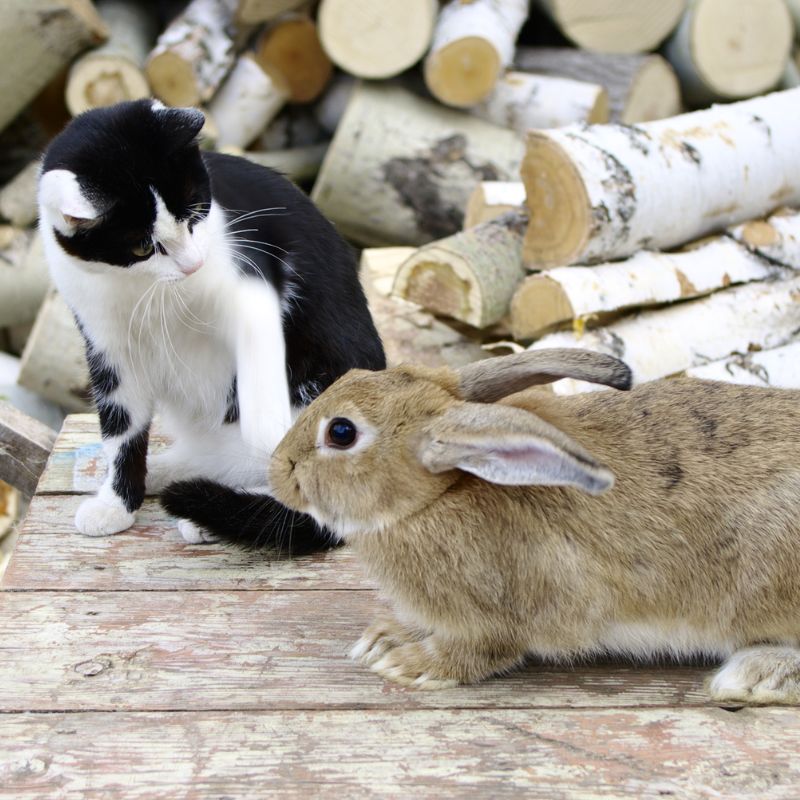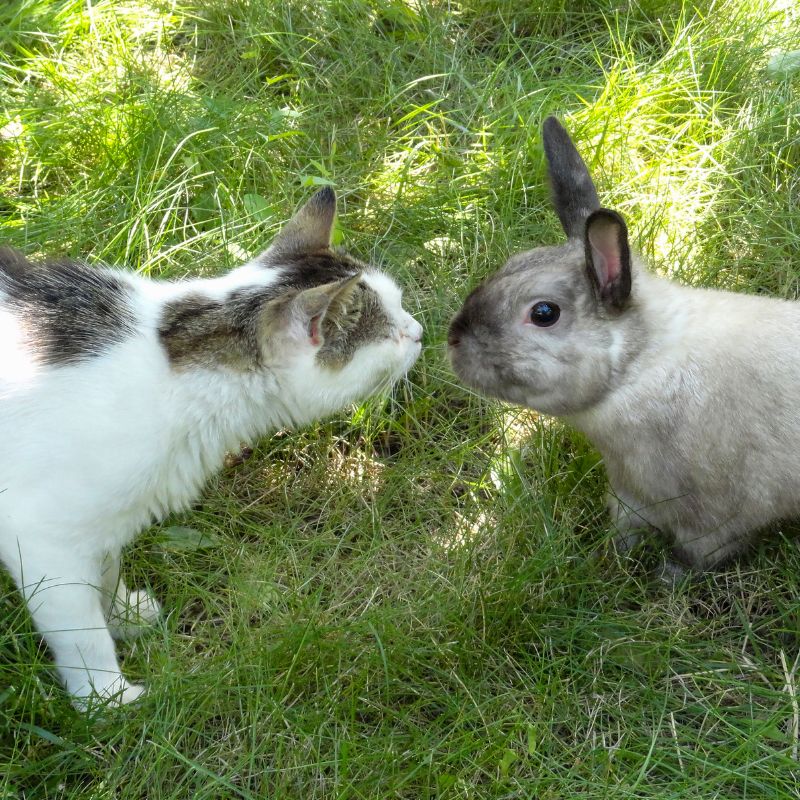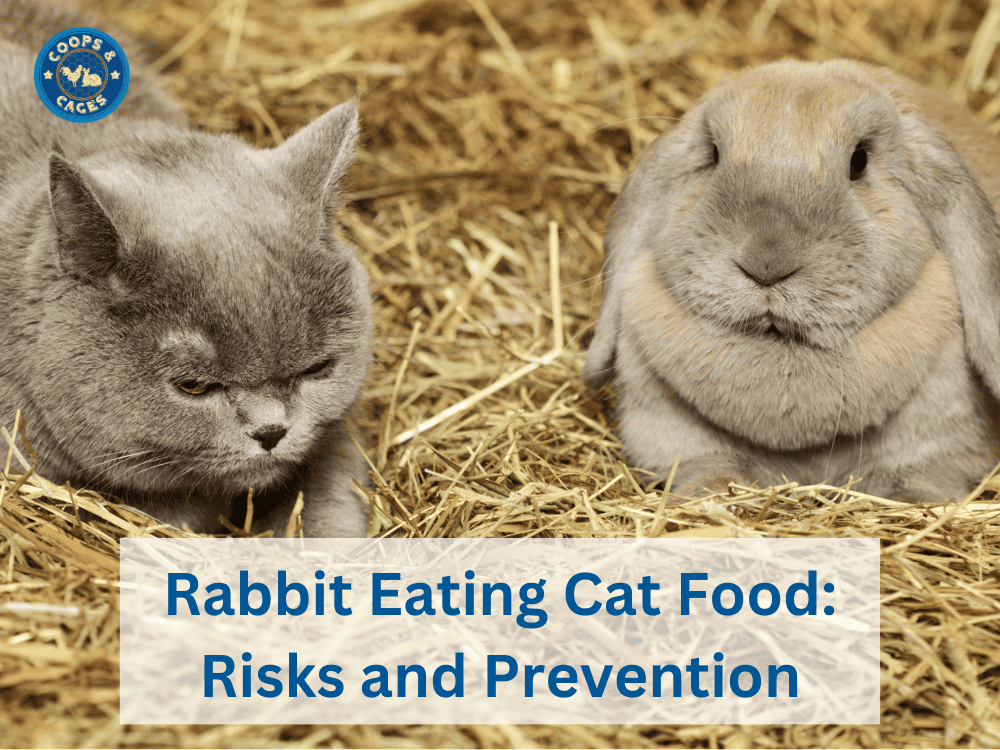Hi, I’m Jordan. Today, let’s chat about something many pet owners might find themselves fretting over: their rabbit eating cat food. We’ll dive into understanding rabbit dietary needs and why cat food doesn’t fit the bill. Learn how to spot signs of digestive troubles in your furry friends.
If you’re stressed because your bunny got into your cat’s dinner bowl – don’t worry! You’ll learn what steps to take when this happens and more importantly – tips on stopping your rabbit eating cat food again.
Understanding the Dietary Needs of Rabbits
Rabbits have unique dietary needs. Unlike cats who are obligate carnivores and thrive on a diet rich in protein from meat sources, rabbits are herbivores with a need for high fibre intake.
Hay
A significant part of a rabbit’s diet should be hay which provides the necessary long-strand fibre that is critical for your bunny’s digestive tract. But not just any type of hay will do; Meadow, Oaten or Timothy Hay make excellent choices.
Fibre plays an essential role in their digestive health because it helps to keep their gut moving correctly. It also wears down rabbit teeth as they chew.
Fresh Greens and Vegetables
In addition to hay, bunnies also benefit from eating fresh greens and vegetables daily such as broccoli leaves, brussel sprouts and kale.
They’re packed full of vitamins that help support overall health. This inclusion does more than just provide nutrition – it mimics the natural grazing behaviour of wild rabbits, helping them feel more at home.
Pellets
Rabbit food pellets can give pet rabbits some added nutrients but remember these should be given in moderation. If you choose pellets, ensure they contain high amounts of fibre without added sugars or seeds.
Treats
Rabbits love treats! Fresh fruit and alfalfa pellets can be given sparingly. Avoid excessive treat consumption which could lead to obesity and other medical issues.
Cat Food Composition and Its Effects on Rabbits
The dietary requirements of rabbits and cats are vastly distinct. Cats are obligate carnivores, meaning their diet is primarily made up of meat. This contrasts sharply with rabbits’ herbivorous diets which consist mainly of hay, vegetables and occasional fruits.
Potential Health Risks for a Rabbit Eating Cat Food
The primary ingredients in cat food include animal by-products such as muscle meat and bone meal.
These protein-rich components can cause severe digestive problems in rabbits due to their sensitive gastrointestinal systems not being equipped to process such high levels of protein.
Bunnies could experience serious health complications if they eat cat food. Kidney damage is a potential consequence of excessive protein consumption due to rabbits not having the necessary enzymes for efficient digestion.
Another significant risk factor is the high-fat content found in cat foods. Foods high in fat can lead to obesity and related disorders like heart disease or liver problems in rabbits or guinea pigs.

Recognising Signs of Digestive Issues in Rabbits
If your rabbit has eaten cat food, it may exhibit signs of digestive discomfort or distress.
Poor Appetite
One clear sign that your bunny might be having tummy troubles is if they’re not eating as much as usual. Rabbits are generally voracious eaters so consuming less than normal could indicate that something’s off with their digestion.
Lethargy
Lethargy is often a symptom associated with poor digestion in rabbits. If you notice your furry friend isn’t quite themselves – maybe they’re more sluggish or inactive than usual – it could signal an upset stomach.
Changes in Faecal Output
Rabbits usually produce large amounts of small, round droppings each day. Changes such as smaller-sized droppings or fewer faeces overall can point towards potential digestive problems caused by improper nutrition.
Bloating and Discomfort
Your rabbit’s abdomen might become enlarged or distended if there are any digestive disturbances. This bloating can cause discomfort which leads them to adopt unusual postures or flinch when touched around the belly area.
If rabbit owners observe these symptoms after suspecting that their pet consumed cat food, it would be wise to seek veterinary care promptly.
What to Do If Your Rabbit Eats Cat Food
If you see your rabbits eat wet cat food or dry cat food, it’s important not to panic. While feeding cat food to rabbits isn’t recommended, small amounts likely won’t cause serious harm. But, if your bunny has had more than just a taste, there are steps you should take.
Immediate Steps
The first step is removing any remaining cat food from the rabbit’s reach and returning them to their regular diet of hay and leafy greens immediately. This helps clear out their digestive system with the proper fibre content they’re used to.
Next up is close monitoring for signs of distress or illness such as changes in behaviour or appetite over the next 24 hours. Even minor alterations could signal an issue related directly to this dietary indiscretion.
Veterinary Care
If you notice that your pet appears unwell after eating cat food – showing symptoms like lethargy, diarrhea or loss of appetite – then don’t hesitate to seek professional help right away. Contacting a vet who specialises in exotic animals will be beneficial because these professionals have unique knowledge about our fluffy friends’ specific needs.

Preventing Your Rabbit from Eating Cat Food
House rabbits are curious by nature and might be tempted to nibble out of the cat food bowl. Let’s explore some strategies to stop your rabbit from tucking into your kitty’s dinner.
Securely Store Cat Food
Store your pet cat’s food in secure containers with tight lids up in high cupboards that rabbits cannot reach. Remove any cat food left over in bowls after mealtime.
Create Separate Feeding Areas
Feed rabbits and cats in separate areas of the house. This separation not only prevents accidental ingestion but also reduces stress for both animals during meal times.
Maintain Regular Meal Times for Both Pets
Establish routine meal times and feed your rabbit before giving meals to your cat – a well-fed rabbit is less likely to explore other sources of nutrition such as leftover bits of kibble.
Increase Supervision During Feeding Times
An extra set of eyes never hurts! Monitor mealtimes closely until you’re confident that there won’t be any sneaky snacking on each other’s dishes.
Provide Enough Hay and Fresh Vegetables for Your Rabbit
A rabbit that’s satisfied with its own diet is less likely to try cat food. Regular access to hay, vegetables and clean water can keep your bunny happy and healthy while curbing any temptation towards other foods.
Jordan’s Wrap
Alright, we’ve covered some solid ground here! You now know why a rabbit can’t eat cat food – it just doesn’t suit their dietary needs.
Rabbits need fibre-rich diets, not the protein-packed chow cats munch on. Spotting digestive problems early can be lifesaving for your bunny.
If you find your rabbit eating cat food, remember to stay calm and take action promptly. Seek vet advice if needed.
And lastly but crucially – prevention is key! By taking practical steps to keep cat food out of reach from rabbits, you’ll be making sure that both your pets are happy and healthy.
For more helpful advice on pet rabbits, visit our Rabbit Learning Centre by clicking here.



